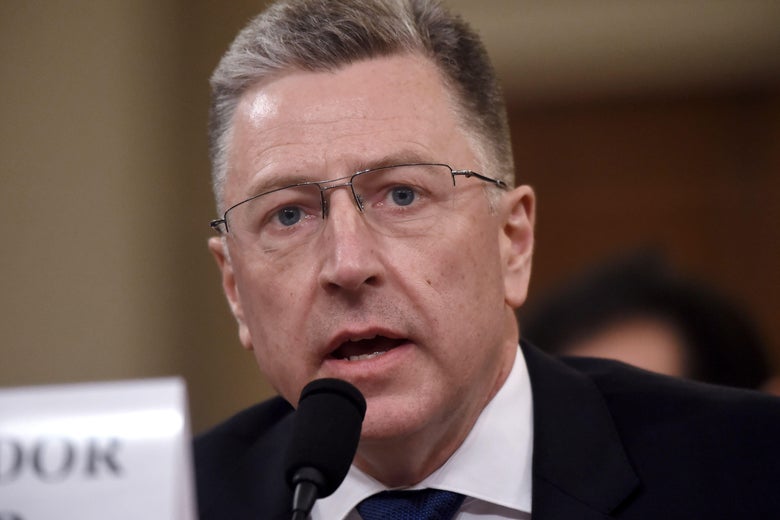
Kurt Volker testifying in Washington on Tuesday.
Olivier Douliery/Getty Images
Kurt Volker, the former U.S. special envoy for Ukraine, said while testifying in a House impeachment hearing on Tuesday that, since he gave his original deposition on Oct. 3, “a great deal of additional information and perspectives have come to light.” Among the most jolting reality checks that hit Volker at some point in the previous 46 days—perhaps during a pensive autumnal stroll—was his realization that perhaps President Donald Trump’s interest in corruption at a specific Ukrainian natural gas concern was not on the level.
“In hindsight, I now understand that others saw the idea of investigating possible corruption involving the Ukrainian company Burisma as equivalent to investigating former Vice President Biden,” Volker said in his opening statement on Tuesday. “I saw them as very different—the former being appropriate and unremarkable, the latter being unacceptable. In retrospect, I should have seen that connection differently and had I done so, I would have raised my own objections.” Alas.
This wasn’t the only addendum or change in emphasis that Volker—who, as the first witness to be deposed in the inquiry, had an interest in hearing what others might say before determining what addenda might be necessary—made in his testimony. In his original deposition, he had said that “investigations” never came up during a July 10 White House meeting; on Tuesday, he said that they had, during an “eye-roll” moment from Gordon Sondland, U.S. ambassador to the European Union.
It might seem incredible that a tenured diplomat might not have been able to realize that Trump—Donald Trump!—was not interested in cleaning up the Ukrainian energy sector per se, but only wanted to dig up dirt on a potential political rival. It might seem incredible because it is not credible. But given Volker’s role as an intermediary trying to negotiate a deal that would release the aid, it’s all he could say without implicating himself.
Much of Tuesday’s testimony focused on the role Volker played trying to iron out a statement Ukraine was supposed to issue to publicly commit itself to “investigations” in an effort to appease Trump. It was Volker who, at Rudy Giuliani’s urging, specifically added references to investigating “Burisma” and “the 2016 U.S. elections” to a draft statement that a Ukrainian aide had run by them, to give it a little more punch. The statement was shelved when the Ukrainians balked at using those specific references at that particular time.
Volker had to testify that, at the time he wrote the terms Giuliani demanded into the statement, he had not fully appreciated that literally everyone else involved considered an investigation into Burisma to be synonymous with an investigation into the Bidens—because to admit that would be to admit that he was facilitating something quite dirty.
“I did not know that President Trump or others had raised Vice President Biden with the Ukrainians, or had conflated the investigation of possible Ukrainian corruption, with investigation of the former Vice President,” Volker said, again, in his opening statement. “In retrospect, for the Ukrainians, it clearly would have been confusing.”
The Ukrainians probably weren’t confused.